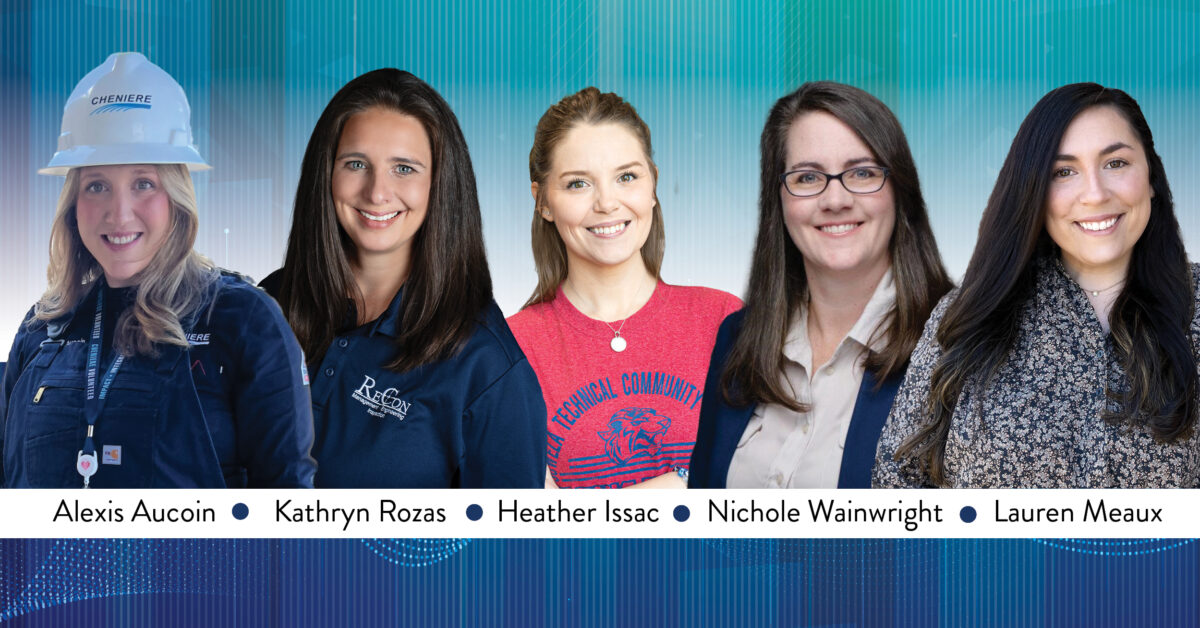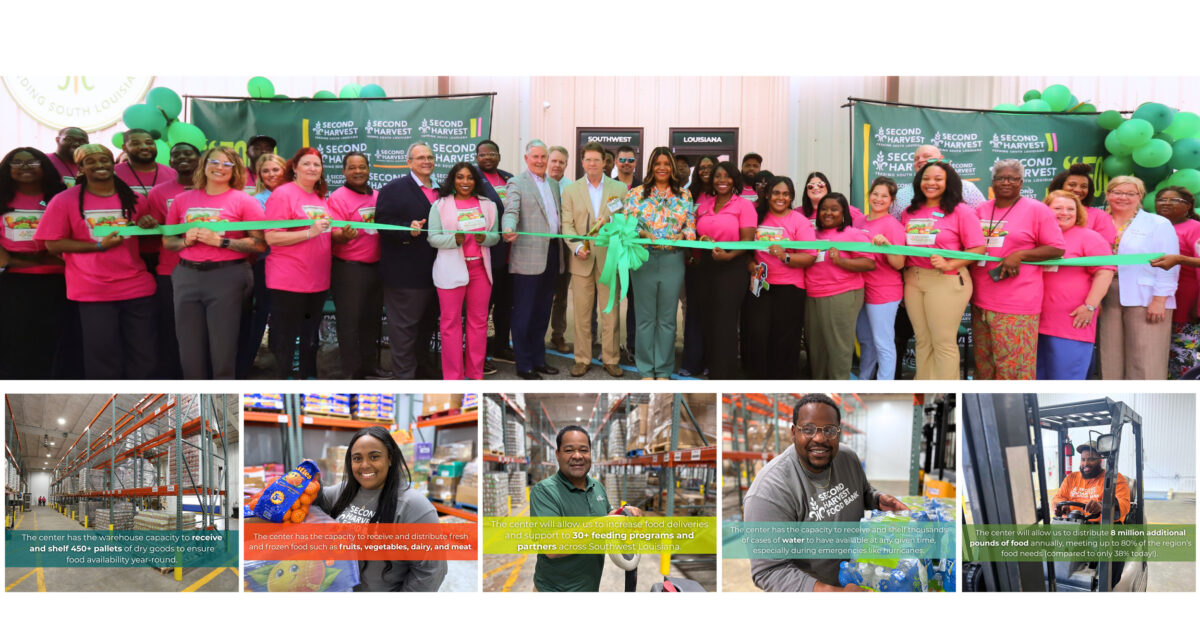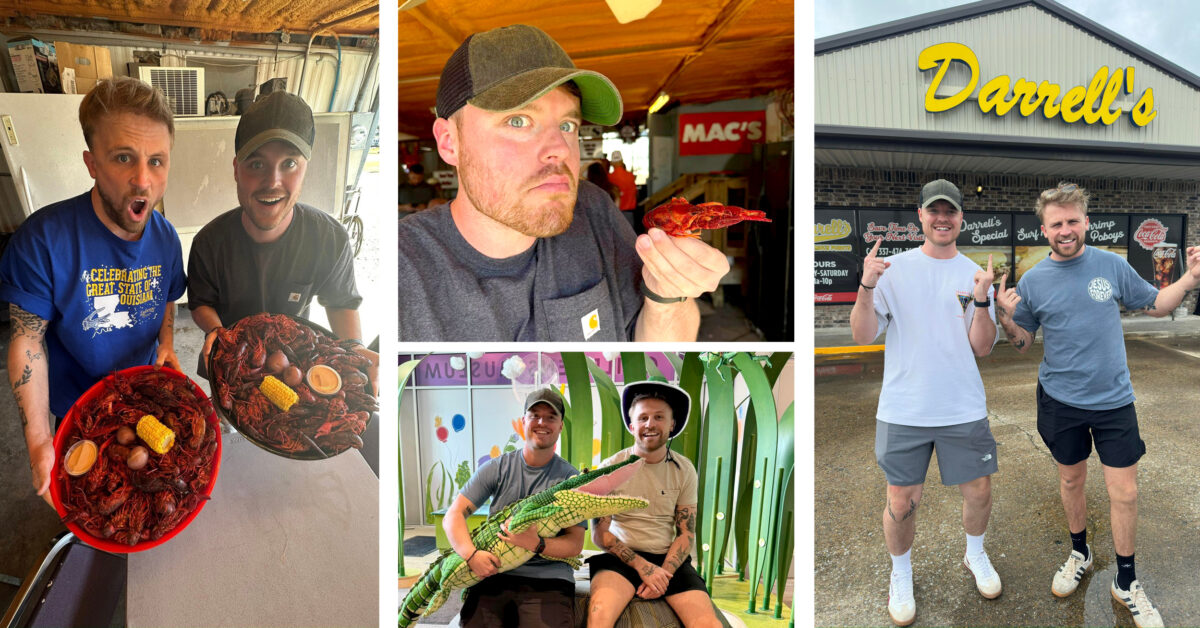
FAMILY WORKS: The Merger of the Century – Bessette and Flavin Real Estate Come Together to Form Century 21 Bessette Flavin
June 2025
The Southwest Louisiana Adventures of JOSH & JASE: Social Media Sensations Visit Lake Charles
June 2025Industry and scientific fields used to be considered the realm of men. However, women continue to get educated to STEM fields and enter the workforce in increasing numbers. As SWLA’s economy relies heavily on local industry, the area is the perfect place for women to start their careers, with plenty of room for upward mobility.
The U.S. Bureau of Labor Statistics reported that in 2023 only 16% of women were employed as engineers or architects, a percentage that’s significantly lower than other STEM disciplines. Despite the significant gender gap in the engineering disciple, local women are steaming full speed ahead in their careers across the local chemical and LNG plants. Here are a few of their stories.
Heather Isaac
Breaking Barriers in the Male-Dominated Field of Process Technology
First impressions never tell the whole story, so when meeting Heather Isaac, a small-framed mother of two, her quiet, calm demeanor didn’t immediately reveal her deep determination and grit. She couldn’t keep it hidden for long, though.
“I grew up blue-collar. My dad was an electrician,” said Isaac. “My brother started as an operator and that piqued my interest in process technology.”
Isaac was also strong in physics and chemistry, which drew her to SOWELA’s Process Technology program. “I love science and how this program incorporates it with vacuum and distillation.”
While Isaac’s love of science gave her a passion for her craft, her road was not easy, and she had barriers to overcome. Fear, confidence and age were all against her—or so she thought.
“I was absolutely terrified at first, afraid to touch anything and do something wrong,” Isaac said, referring to the Hands-on Training or HOT units where SOWELA students learn how to read and assess various instruments in a chemical plant.
It was intimidating at first, but now she can confidently read every instrument.
“From classmates to every teacher, they made the difference,” said Isaac. “Mr. Hebert helped me schedule-wise on my first day. Mr. Finn and Mrs. DeMary—office hours weren’t office hours. They were always here to help, and I’ll never forget Mr. Landry. They feel like family. That’s been the most amazing part.”
Her second barrier? Confidence.
“Walking into a class full of guys, I was hesitant,” said Isaac, “but completely wrong. The guys I was intimidated by are now my friends, and they encouraged me to be confident.”
The final barrier was age.
“I came back to school at 35, and at first, I thought I was too old,” said Isaac. “But you’re never too old to learn something new. I have kids and a husband, so it was a lot of hard work, but today, I’m so proud of myself for finishing. I refuse to let myself fail. You’re never too old.”
Beginnings
Before finding her love for process technology, Isaac ran a photography business, worked a few part-time jobs and was a full-time mom. She attended a university and completed most of her general education requirements but didn’t finish her degree.
Isaac decided it was time for a change and the chance to excel in a career that would provide stability for her family and professional achievement.
“I have a 15-year-old daughter. She watches. She saw me at points having a hard time, spending hours at the dinner table studying and making bad grades,” said Isaac. “But she also saw me not letting that stop me and how I kept moving forward.”
Plus, those university credits were transferable to SOWELA’s Process Technology program, and Isaac earned her degree in one year.
The Next Chapter
After participating in mock interviews at SOWELA with local industry leaders, Isaac began an operator internship with Westlake. While these are meant to be practice interviews, Isaac made such a strong impression that she earned one of two coveted summer internships at the plant.
Her ultimate goal: “Find a plant that is home. Based on how it is at SOWELA, I can only imagine the type of team I’ll find in the field,” said Isaac.
With her perseverance and work ethic, there is no doubt that if she doesn’t find it, she will build that kind of team around her.
Nichole Wainwright
Director of Technical Support, Phillips 66
by Kerri Cooke
For Nichole Wainwright, a chemical engineer at Phillips 66 for over 25 years, refining runs in her family. “Both my parents worked in local industry, and my mom involved me in volunteer opportunities through the refinery where she worked. I was exposed to engineers at these events who made the career sound fun and interesting,” she says. However, it wasn’t until the dean of the McNeese State University engineering department visited her class at LaGrange High School when she was a senior that she decided to pursue the profession for herself.
The wide range of jobs a chemical engineer can hold—manufacturing, energy production, pharmaceutical, food and beverage, environmental engineering—is one of the factors that sold Wainwright on the career. “Chemical engineers get to find innovative and creative solutions to new and complex challenges that improve the quality of life for people around the globe. We develop sustainable processes, improve efficiency, ensure the safety and quality of products such as the gasoline, diesel and jet fuel that improve efficiency of travel or the butane you might use at your local Louisiana crawfish boil.”
Since Wainwright has been a chemical engineer for a significant amount of time, she has held many different positions throughout her career, including roles in advanced automation, production planning, scheduling and optimization, operations engineering, operations management, process safety management and project management. She is now director of technical support, where she mentors and supports the advancement of fellow engineers. Her daily routine includes starting the morning with a team meeting “where we discuss our safety/environmental, production and reliability performance relative to our targets. The remainer of the day’s schedule will vary depending on our production plan or special projects our team is working on. While activities vary day-to-day, they all fall into one or more of these categories: health/safety/environmental, reliability, people, margin improvement and cost savings. I collaborate daily with engineers, operators, machinists, electricians, scientists, lab technicians, accountants, HR professionals, technical experts and so many more individuals with specialized skillsets to provide energy and improve lives.”
In addition to her work at Phillips 66, Wainwright also loves to volunteer, something the company provides ample opportunities for. And she gets to share her knowledge on STEM careers with kids and adults in local schools.
As a woman in STEM, Wainwright says at the beginning of her career it wasn’t as common to see women in roles like hers, but over the years, the number of females in industry has increased. “Midway through my career, I was the leader of the first all-female operations engineering team in the site’s history. I’m so fortunate to work for a company with the values of safety, honor and commitment to all regardless of their gender.”
Wainwright’s advice to girls considering pursuing a career in STEM? “Find someone already in a STEM career—spend time with them, ask them questions and find out what drives and motivates them. Find a group of allies to nurture and guide you through challenges, educate yourself on the journey of other women in pioneering or STEM fields, resist the temptation to believe STEM careers are not for women and look for opportunities to intern/co-op in a STEM role.” She also emphasizes that it is possible to have and juggle both a family and a STEM career.
As for what the future holds, Wainwright wants to continue learning and growing on her current career path. She also wants to “grow stronger in my faith” and offer leadership training again, something she has done in the past. She’s also open to the possibility of teaching once she retires.
Alexis Aucoin
Process Engineer, Cheniere
by Kerri Cooke
Alexis Aucoin is a process engineer at Cheniere, a career that she finds particularly rewarding. “We supply natural gas to people across the world. It’s easy for me to get lost in the day-to-day minor details, but when I take a step back and think about all the times I’ve solved complex problems that allowed us to increase production, I realize I have actually impacted lives around the world.”
A native of SWLA, she graduated high school from Sam Houston High and obtained a bachelor’s degree in chemical engineering from McNeese State University. Aucoin says she’s always enjoyed problem solving, even when she was very young, but didn’t pursue a career in engineering until a neighbor encouraged her. She “was a very successful engineer and mother. Seeing her thrive not only in her personal life, but also professionally, was truly inspiring.” Aucoin, who is expecting her first child in August, will soon be able to follow her example as she learns how to balance her career and family life.
Aucoin’s first engineering job was at Westlake Chemical in process design. “I re-vamped or designed new equipment. The experience allowed me to develop the textbook fundamentals of how equipment is designed to operate.”
Now in her role at Cheniere, Aucoin is “responsible for process monitoring and optimization of the liquefaction part of the process. I work with the operations, maintenance, health and safety and other engineering teams on a daily basis to maximize production safety and reliability.”
Growing in knowledge over the years, Aucoin says she has learned the value of teamwork and that it’s ok not to have all the answers. “I now know what questions to ask and when to involve other subject matter experts, which allows me to successfully tackle problems more efficiently.”
As a woman in a STEM career, Aucoin thrives on the challenge. “I’ve strived to break barriers, continuously learn and push myself more than I thought imaginable.” Encouraging other women who might have an interest in an engineering or related field, Aucoin says, “Confidence is key. Don’t be afraid to voice your opinions and ask questions. Find your voice early on and always believe and advocate for yourself. Also, don’t be afraid to take risks. Get out of your comfort zone, be curious and seek opportunities.”
Lauren Meaux
Senior Process Engineer, Cameron LNG
by Kerri Cooke
Lauren Meaux says she became a chemical engineer due to the encouragement of her calculus teacher, Mr. Lorio, during her senior year of high school. “He would tell me nearly every day after class that I needed to go to school for chemical engineering and that I would make a great engineer. He continued to root for me throughout my time in college.”
Originally from New Roads, Louisiana, Meaux joined the engineering program at the University of Louisiana at Lafayette. She was grateful for the ability to interact closely with professors for a better understanding of her coursework. Another motivating factor as Meaux was working towards her degree was that “there was always some sort of competition going on between the different engineering disciplines which made it fun to be a part of.”
Meaux began gaining engineering experience through internships while still in college. She interned at Westlake Chemical Polymers during the summer of her sophomore year, completed two co-ops at CITGO Petroleum Corporation before beginning her senior year at UL Lafayette and was offered a job as a unit process engineer at CITGO upon graduating.
“I’ve worked as a process engineer in the Operations Engineering Department supporting various units in the refinery and participating in many unit turnarounds and outages. I also spent a brief period as a process controls engineer in the Automation Group.”
Meaux was in the refining industry for seven years before transferring her skills to the LNG sector, working at Venture Global’s Calcasieu Pass location before transferring to Cameron LNG. She has been with Cameron LNG for two years and works as a senior process engineer.
What does a senior process engineer do?
“I’m responsible for monitoring facility process data to identify optimization opportunities and maximize production efficiency,” Meaux says. I provide daily technical support and troubleshooting assistance to the operations and maintenance teams across the facility. In addition, I develop work scopes and lead the execution of small-scale process improvement projects.”
Meaux find chemical engineering to be a rewarding career as she’s “had the opportunity to work on high-impact projects that contribute meaningfully to industries critical to the global economy. There is a strong sense of fulfillment that comes from solving technical challenges and continuously learning in a fast-paced environment.”
It’s an “empowering experience” to be a woman working in a STEM career, Meaux says. “While the number of women in industry is steadily growing, I’ve often found myself as one of the few—or, at times, the only—woman in the room. This can bring added pressure to prove my capabilities and creates a sense that any misstep might reinforce outdated stereotypes about women in engineering. That said, these experiences have also been a great source of motivation that push me to continuously learn and advocate for myself and other women entering the field.”
Meaux encourages other women to pursue a career in STEM if that’s their area of interest and to not “be intimidated by what you don’t know. What truly matters is your willingness to ask questions and take on challenges. Diversity of thought and background drives innovation and your fresh perspective will always bring value to the table.”
As to what the future will bring, Meaux has an interest in becoming a subject matter expert in LNG and obtaining a leadership role so she can mentor others. She also desires “to contribute to process improvements that make the LNG industry safer and more efficient.”
Kathryn Rozas
Process Engineering Manager, ReCon Management Services, Inc.
by Reagan Hooper
Kathryn Rozas is the process engineering manager for ReCon Management Services, Inc. in Sulphur, Louisiana. In this position, Rozas supervises 10 process engineers on various projects, coordinates work with clients, develops proposals and reviews engineering packages for quality assurance. Her responsibilities also include making sure every engineer in the process department has the tools to complete their work with excellence.
Kathryn was raised in New Iberia, Louisiana. Her favorite subjects in school were math and science, eventually chemistry. After graduation, it only made sense for her to major in chemical engineering. The University of Louisiana at Lafayette was the perfect fit for Rozas; she could go to college and be fully immersed in that experience while still only being 30 minutes from her family.
ReCon Management Services, Inc. has been in operation for 30 years, offering professional quality engineering consultation to clients on a regional level across the Gulf coast. “I love working at ReCon because I have been able to work for so many clients within different industries. Also, as ReCon is a family-oriented company. It has given me the opportunity to have a good work-life balance,” Rozas says. In the future, she hopes to further her success and obtain her professional engineering certification.
When Rozas first started at ReCon, she worked in the same department she is now managing. As a process engineer, she would complete the necessary analysis for many projects. She started working in the Process Engineering Department in 2012, at that time the department was made up of 70% men. Now, 13 years later, the same department consists of more than 50% women. This progress is encouraging to women that desire to be in the field, displaying that they are valuable in the STEM space.
She looks forward to seeing those percentages grow across the engineering industry. “More women are entering the engineering field, which is awesome.” A big believer in hard work and perseverance, Rozas wants to encourage every young girl who is interested in STEM to take time and research career paths in the field that interests them—then pursue it with determination.






